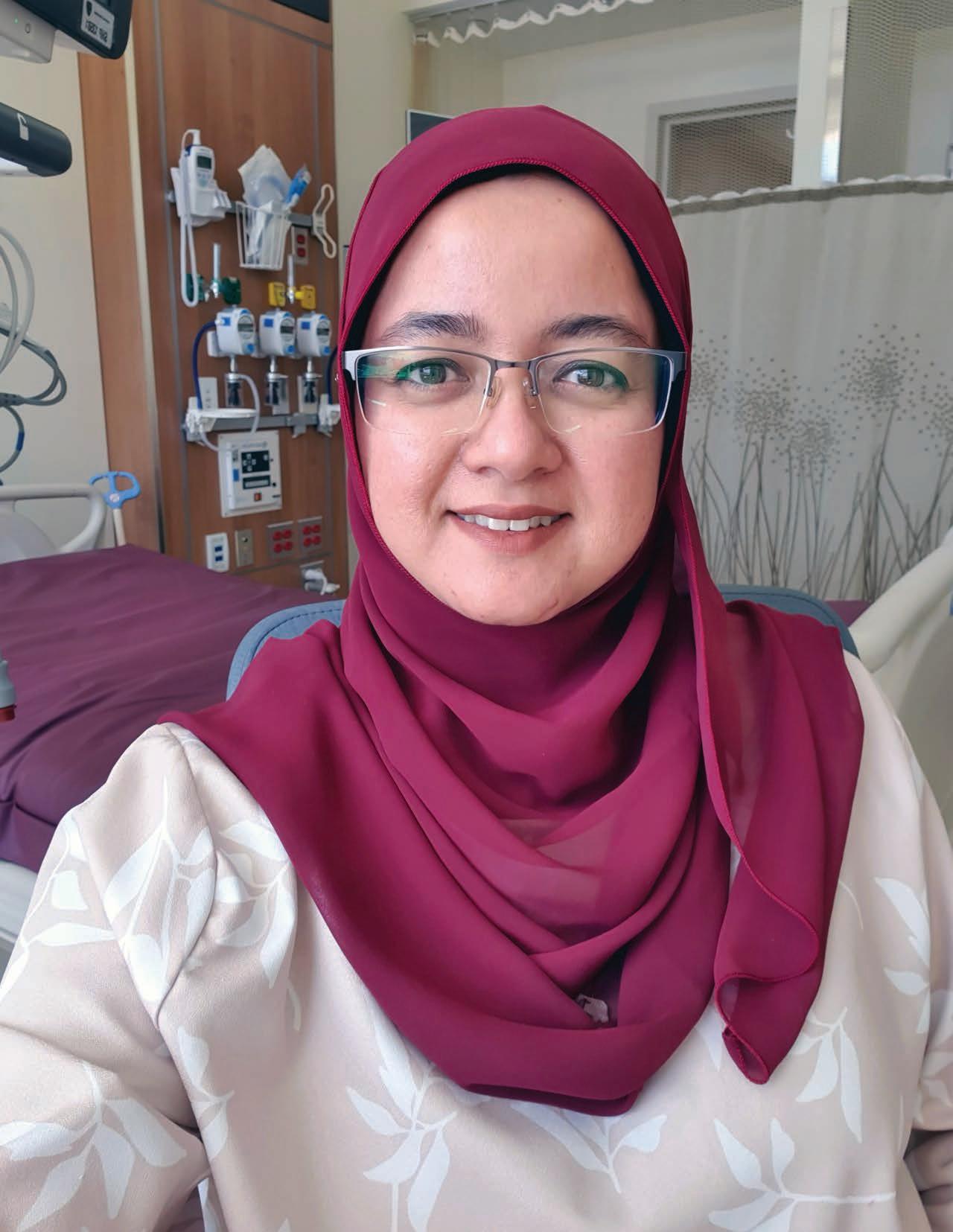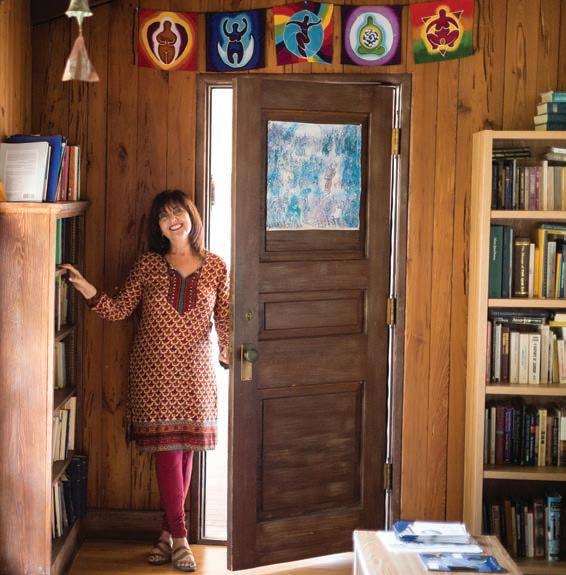
6 minute read
Spiritual Care Meets Its Moment
SPIRITUAL CARE Meets Its Moment The GTU’s Interreligious Chaplaincy Program arrives amid heightened awareness and urgent need
The calamity of the coronavirus pandemic has produced an unexpected side effect: the growth of spiritual and pastoral care.
“It’s a golden age of chaplaincy,” says Kamal Abu-Shamsieh, PhD ’19, director of the Graduate Theological Union’s new Interreligious Chaplaincy Program, which launched its first cohort this August. He's the founder of the nonprofit Ziyara Muslim Spiritual Care, which provides Muslim pastoral care and trains spiritual-care providers.
“The pandemic has created the conditions where physicians, nurses, and different layers in the healthcare system are recognizing more and more the significance of chaplains,” says Abu-Shamsieh, who, in addition to his doctorate from the GTU, earned a master’s in Islamic Studies and an Islamic Chaplaincy Graduate Certificate from Hartford Seminary. Ziyara received more referrals than ever this spring, he says, from institutions seeking care for patients — and also for providers.
“Frontline healthcare providers feel burned out and are seeking more support,” he continues. “They experience a lot of loss that requires reflection on their own life, on their professional contributions, on whether they have been able to save someone’s life or not.” The military, prisons, corporations, and other organizations also have increased needs, he says. “All the conditions, challenges, and difficult questions imposed by the pandemic create the opportunity for a chaplain to address the spiritual elements of someone’s life.” 8 Graduate Theological Union | gtu.edu
Program director Kamal Abu-Shamsieh gives a talk on chaplaincy at the University of Tübingen. Photo courtesy of Dr. Mouez Khalfaoui
— Kamal Abu-Shamsieh
That makes the long-planned launch of the GTU’s Interreligious Chaplaincy Program uniquely relevant for the times into which it arrives. It’s the third chaplaincy offering in the GTU consortium, joining Christian and Buddhist programs. It provides the skills and interreligious understanding necessary for chaplains to meet the spiritual and religious needs of increasingly diverse populations, as well as expertise in religious traditions that have traditionally been underrepresented among institutional chaplains. Students with a master’s degree can pursue a graduate-level Certificate in Interreligious Chaplaincy. Those without a master’s can apply for the chaplaincy certificate alongside a master’s in Islamic, Jewish, or Hindu Studies. Students can take classes in all three of the GTU’s chaplaincy programs. “That makes our program the hub for chaplaincy worldwide — no other seminary is offering what we are offering,” Abu-Shamsieh says. A curriculum for its time The ongoing shortage of personal protective gear and extreme transmissibility of COVID-19 has changed the nature of chaplaincy.
“The mantra of spiritual care is ‘the ministry of presence’ — we are present with our patients, with their families, and that presence invokes intimacy,” Abu-Shamsieh explains. “We are there when our patients need a hand, or a shoulder, or someone to comfort them in person.” With public-health-prescribed limits on personal contact, “the overwhelming majority of that setting is now removed,” he says.
The virtual care that takes place over electronic devices is supportive, he says, but lacks the intimacy of in-person care. Tele-chaplaincy reimagines what support looks like, including being available when and where help is needed — without concern for physical location — and conducting events such as virtual funerals.
Completing a chaplaincy residency at Stanford health, Interreligious Chaplaincy student Sakinah Alhabashi struggled with her own grief as she walked others through theirs. “Yet, this pandemic has underscored even more the importance of emotional and spiritual resilience,” she says. Photo: Sakinah Alhabshi

Spiritual Care Continued from page 8 The chaplaincy program takes into account these new realities. “We struggle with it in academia the same way professional chaplains are struggling with it in on the job every single day,” he says.
Tele-chaplaincy training will be put into practice during students’ Clinical Pastoral Education (CPE), a required four-month, hands-on residency in a hospital or other setting. Most seminaries place this responsibility fully with the students, who must independently apply for a clinical site and complete their certificate.
But many students have trouble navigating the process, Abu-Shamsieh says. “That’s why our approach is to walk along with our students, advising them while they do their CPE and, of course, afterward.” An accomplished cohort Students in the first cohort are already professionally and academically accomplished. Some have theoretical backgrounds and seek spiritual-care training. Others have hands-on experience and came to focus on the theoretical and theological underpinnings of chaplaincy.
Sakinah Alhabshi, a native of Malaysia, recently completed a yearlong accredited chaplaincy residency at Stanford Health Care. Trained as an engineer, Alhabashi spent a decade in the corporate world while volunteering with various Muslim and interfaith organizations such as hospice and disaster-relief.
When Abu-Shamsieh, then a relief chaplain at Stanford Health Care, gave a talk in Kuala Lumpur in 2017, Alhabshi had already decided to pursue a master’s in counseling or religion. Hearing about professional healthcare chaplaincy and CPE was a revelation.
“It felt like God was giving me such a gift! Such clarity of something that aligned with what my heart and mind were seeking, yet struggling to put into words,” she says. A year later she applied to chaplaincy residencies and accepted Stanford Health’s offer. 10 Graduate Theological Union | gtu.edu

She describes doing her residency during the COVID-19 pandemic as “extraordinary.” She struggled with her own grief as she walked others through theirs. “Yet, this pandemic has underscored even more the importance and value of emotional and spiritual resilience,” she says. She learned to use tele-chaplaincy to provide care, including end-of-life support to patients and their families — facilitating prayers and ‘’goodbye’’ conversations and rituals online.
The GTU’s Islamic Studies master’s and Interreligious Chaplaincy Certificate made logical next steps. And, coming from Malaysia’s multi-ethnic and multi-religious environment, she adds, the diverse faculty, student body, and curriculum made her feel at home.
Yudit Kornberg Greenberg, another inaugural-cohort student, directs the Jewish Studies Program and the Center for India and South Asia at Rollins College in Florida and has authored two books that explore cross-cultural perspectives. The program’s interfaith approach aligns with her existing work and her intention to provide spiritual care to different faith communities.
“My academic career has been informed and shaped by cross-cultural perspectives and interfaith dialogue and engagements,” she says. Unlike other chaplaincy programs, she describes this one as “built upon the paradigm of interreligious co-existence and cooperation.”
Rollins College professor Yudit Kornberg Greenberg said the program fit her career, which has been shaped by cross-cultural perspectives and interfaith dialogue. Photo: Scott Cook, courtesy of Rollins College
The current societal climate has added to the program’s relevance, she says. “Our identities as Jews, Hindus, and Muslims notwithstanding, we are all in the same boat trying our best to survive and live meaningful lives.” In a time of such unprecedented upheaval, she adds, “Providing spiritual care to anyone in need … is an existential necessity and a mitzvah — a commandment or good deed — that I intend to practice with humility.” Increasing Student Support With the growing demand for chaplaincy and a program that fills a training gap, Abu-Shamsieh says the only missing component is more financial support for students. One fellowship exists for students affiliated with the Center for Jewish Studies, but he’s appealing to foundations and donors for more support. “This is a postgraduate certificate, so many students have families and existing student loans — for themselves or their children,” he says.
There’s a shortage of chaplains, especially Muslim, Hindu, and Jewish leaders trained to work in interreligious settings, he notes.
“This program is creating leaders for a space where there’s a shortage of leaders,” he says. “So, in addition to distinguishing our graduates with our unique approach, we want to make it possible for them to complete their training so they can be in the workforce.” — Ann Brody Guy









